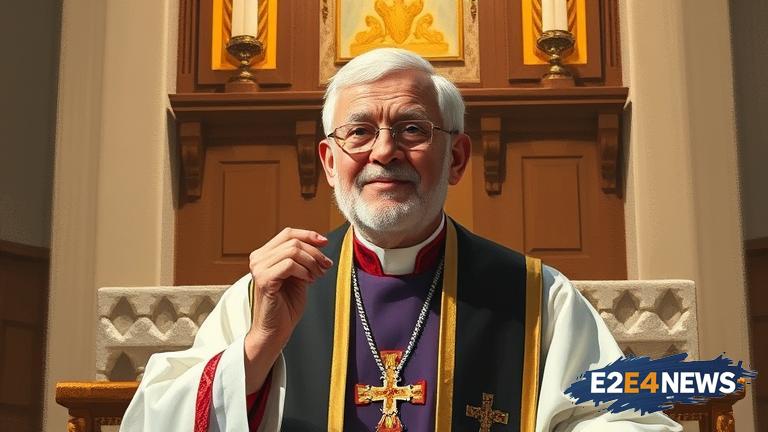In a recent interview, Bishop Fernandes shared his thoughts on various topics related to the Catholic Church, including vocations, the Latin Mass, and the importance of developing a prayer life. He emphasized the need for young people to consider a vocation to the priesthood or religious life, citing the example of Saint John Paul II, who was a strong advocate for vocations. Bishop Fernandes also discussed the significance of the Latin Mass, which he believes is an important part of the Church’s tradition and heritage. He noted that the Latin Mass is not just a matter of personal preference, but rather a way of connecting with the Church’s rich history and liturgical tradition. The bishop also addressed the controversy surrounding Archbishop Vigano, who has been a vocal critic of the Church’s handling of various issues, including the COVID-19 pandemic and the use of vaccines. Bishop Fernandes encouraged Catholics to focus on developing a deep prayer life, which he believes is essential for living a virtuous and holy life. He recommended that Catholics set aside time each day for prayer, whether it be in the form of meditation, contemplation, or simply speaking with God. The bishop also emphasized the importance of seeking guidance from spiritual directors and confessors, who can help individuals develop a deeper understanding of their faith and cultivate a more meaningful prayer life. In addition to discussing these topics, Bishop Fernandes also shared his thoughts on the role of the laity in the Church, noting that they have a critical role to play in spreading the Gospel and living out their faith in the world. He encouraged Catholics to be bold in their witness and to not be afraid to share their faith with others. The bishop also discussed the importance of Catholic education, citing the example of Catholic schools and universities, which provide young people with a strong foundation in their faith and help them develop into well-rounded and virtuous individuals. Furthermore, Bishop Fernandes touched on the topic of social justice, emphasizing the need for Catholics to be advocates for the poor and vulnerable. He noted that the Church has a long tradition of caring for the marginalized and oppressed, and that this is an essential part of living out the Gospel. The bishop also addressed the issue of clericalism, which he believes is a significant problem in the Church. He encouraged priests and bishops to be more humble and servant-like in their approach, rather than seeking to exert power and control over others. In terms of his own ministry, Bishop Fernandes shared his vision for the Church, which includes a renewed emphasis on evangelization and outreach to those who are marginalized or disconnected from the Church. He also discussed his plans for promoting vocations and supporting those who are discerning a call to the priesthood or religious life. Overall, the bishop’s interview provided valuable insights into the state of the Church and the importance of living out one’s faith in a meaningful and authentic way. By emphasizing the need for vocations, the significance of the Latin Mass, and the importance of developing a prayer life, Bishop Fernandes offered a powerful reminder of the Church’s rich tradition and heritage. As the Church continues to navigate the challenges of the modern world, the bishop’s words serve as a timely reminder of the importance of staying true to its core teachings and values. The interview also highlighted the bishop’s commitment to promoting Catholic education and social justice, as well as his desire to see the Church become more humble and servant-like in its approach. As the Church looks to the future, it is clear that Bishop Fernandes will play an important role in shaping its direction and promoting its mission. With his emphasis on vocations, prayer, and evangelization, the bishop is helping to inspire a new generation of Catholics to live out their faith in a bold and meaningful way. By sharing his thoughts on these and other topics, Bishop Fernandes has provided a valuable contribution to the ongoing conversation about the Church and its role in the world. His words offer a powerful reminder of the importance of living out one’s faith in a way that is authentic, meaningful, and true to the Church’s rich tradition and heritage.
